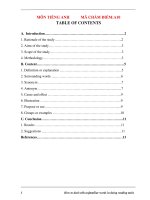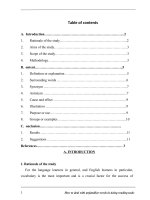Topic 2 how to deal with contractual disputes
Bạn đang xem bản rút gọn của tài liệu. Xem và tải ngay bản đầy đủ của tài liệu tại đây (451.08 KB, 23 trang )
<span class="text_page_counter">Trang 2</span><div class="page_container" data-page="2">
<b>TEAM WORKING REPORT </b>
Group: 02 Grade: 4529_N01
<b>1. Team work plan</b>
</div><span class="text_page_counter">Trang 3</span><div class="page_container" data-page="3"><b> - Content: </b>
+ Group meeting to agree on ideas
+ Make an outline and send it to the teacher + Edit and finalize
+ Divide the portions for each person
+ Extension of specific deadlines for each part + Check reviews for each other
+ Complete the form of the word version + Team leader checks for the last time
<b> - Power point: 2 members find images, video, ..and the others design - Division of presentations : all members usualy practice</b>
<b>- Group meeting and review before the test session.</b>
<b>Result of article score: ...</b>
Teacher marks first: ………. Teacher marks the second:.……… Teacher for the presentation: ………….
<b>Final conclusion: ………</b>
Teacher's final rating: …………
Teacher for the presentation: ………….
</div><span class="text_page_counter">Trang 4</span><div class="page_container" data-page="4"><i>Nguyen Thi Thu Ha</i>
</div><span class="text_page_counter">Trang 5</span><div class="page_container" data-page="5">1.2.The causes of contractual disputes and purposes of dealing with them………..…..5
1.3.Some requirements when settling contractual disputes………..…...6
II. How to deal with contractual
</div><span class="text_page_counter">Trang 6</span><div class="page_container" data-page="6">A contract is a satisfaction with a document, a document transaction between related parties about the performance of a job, in which there is a clear definition of the rights and obligations of each party to orient and comply with the contract. according to the provisions of the law as well as the content agreed in the contract. However, in reality, there are still cases where the rights and obligations of the parties are classified, leading to disputes. So what is a contract dispute and how it will be resolved will be clearly shown in the essay below.
<b>CONTENTI. Overview of dealing with contractual disputes1.1.Definition</b>
Contract law disputes are the most common disputes in business or commercial dealings. Contractual disputes can arise between suppliers and retailers, contractors and subcontractors, in between partners, in between parties to a land contract or in a joint venture agreement. Contract law disputes can be a complicated aspect of the law, which is why we encourage you to contact our team of expert commercial lawyers should any questions arise.
<b>*The Legal basis:</b>
+The Arbitration Rules of the International Chamber of Commerce (ICC)
</div><span class="text_page_counter">Trang 7</span><div class="page_container" data-page="7">+ The Hague Convention of 11 June 1955 on the Law Applicable to the International Sale of Goods.
+Nations Convention on International Trade in Goods of 11 April 1980 (CISG) +Clause 307 Vietnam Commercial Law 2005
+ ...
<b>*Common types of disputes:</b>
There are some common types of disputes, such as: Issues when your client reviews your contract; Issues concerning an offer you’ve made in a contract; Disagreements regarding the meaning of a contract’s technical terms; Mistakes and errors concerning the terms you’ve addressed in a contract; Fraud, such as a party claiming they’ve been forced into signing your contract; Disputes where those involved in a contract do not stand by their original agreements made months or years earlier.
Disputes can also involve the performance of a party’s duties, or where they have failed to perform their duties, which have been addressed in a previously formed contract. This is known as breach of contract. An example could be a seller failing to deliver goods to a buyer.
<b>1.2. The causes of contractual disputes and Purposes of dealingwith them</b>
<i>*Some of the fundamental causes of contract disputes:</i>
The first one is the contract itself. The language used is commonly impenetrable and unintelligible, certainly to those without a legal background but often also to trained people.
There is a strong disincentive for many non-lawyers to actually read the contract, because past history has taught them that the effort will not lead to any real understanding. The upshot is that an undue amount of trust is fostered in the belief that the
<small>7</small>
</div><span class="text_page_counter">Trang 8</span><div class="page_container" data-page="8">lawyers have got everything right, that the contract is complete, consistent, correct, practical and precise.
Presence of an ambiguous contract clause that can be interpreted in different but valid ways.Absence of a specific clause, and each party adopts a different approach for dealing with the missing subject matter. Often, a facts-based discussion between the parties about the difference can resolve the matter, but it’s when the ‘facts’ are not accepted as such by a party and the difference cannot be reconciled that a full-blown dispute can occur.
<i>*Purpose of dealing with contractual disputes:</i>
Firstly, Conflicting issues between the two parties are handled to ensure the interests of both parties. Secondly, Successful resolution sometimes creates a good foundation for a future relationship. Thirdly, the dispute resolution process may be supported; Check whether the provisions in the efficiency law are already high enough for appropriate development amendments.
Dealing with contractual disputes is vere important. When handled without the right skill, knowledge and approach, a contractual dispute can end badly, causing harm to relationships, reputation and finances.
<b>1.3. Some requirments when settling contractualdisputes</b>
Fast, convenient, does not limit or hinder business and commercial activities.
Restore and maintain the relationship of cooperation and trust between the parties in the business.
</div><span class="text_page_counter">Trang 9</span><div class="page_container" data-page="9">Keeping business secrets, reputation of parties and Minimum cost savings.
<b>II. How to deal with contractual disputes</b>
There are four commonly used methods of resolving contractual disputes such as: Negotiation, Mediation, Arbitration and Court . The issue of choosing an appropriate commercial dispute settlement method should be considered by the parties and selected on a series of factors such as the objectives to be achieved, the nature of the dispute, the business relationship between the parties. Therefore, when choosing a dispute settlement method, the parties need to clearly understand the nature and consider the advantages and disadvantages of each method to make a reasonable decision.
<b>*Definition: Negotiation has been defined as any form of direct or indirect</b>
communication whereby parties who have opposing interests discuss the form of any joint action which they might take to manage and ultimately resolve the dispute between them.
<b>*Characteristics of a negotiation</b>
<b>Voluntary: No party is forced to participate in a negotiation. The parties are</b>
free to accept or reject the outcome of negotiations and can withdraw at any point during the process.
<b>Non-adjudicative: Negotiation involves only the parties. The outcome of</b>
a negotiation is reached by the parties together without recourse to a third-party neutral.
<b>Informal: There are no prescribed rules in negotiation. The parties are free to</b>
adopt whatever rules they choose, if any. Generally they will agree on issues such as the subject matter, timing and location of negotiations.
<b>Confidential: The parties have the option of negotiating publicly or</b>
privately. In the government context, negotiations would be subject to the criteria governing disclosure as specified in the Access to Information Actand the Privacy Act.
<b>Flexible: The scope of a negotiation depends on the choice of the parties.</b>
The parties can determine not only the topic or the topics that will be the subject
<small>9</small>
</div><span class="text_page_counter">Trang 10</span><div class="page_container" data-page="10">of the negotiations, but also whether they will adopt a positional-based bargaining approach or an interest-based approach.
<b>*Advantages of negotiation</b>
In procedural terms<i>, negotiation is probably the most flexible form</i>
of dispute resolution as it involves only those parties with an interest in the matter and their representatives, if any.
The parties are free to shape the negotiations in accordance with their own needs. By ensuring that all those who have an interest in the dispute have been consulted regarding their willingness to participate and that adequate safeguards exist to prevent inequities in the bargaining process (i.e., an imbalance in power between the parties), the chances of reaching an agreement satisfactory to all are enhanced.
Negotiation is a voluntary process.<i> No one is required to participate in</i>
negotiations should they not wish to do so.
There is no need for recourse to a third-party neutral. This is important when none of the parties wants to involve outside parties in the process, e.g., the matter to be discussed or the dispute to be resolved may be highly sensitive in nature.<small>1</small>
Negotiations may preserve and in some cases even enhance the relationship between the parties once an agreement has been reached between them.Opting for negotiation instead of litigation may be less expensive for the parties and may reduce delays.
<b>*Disadvantages of negotiation</b>
A particular negotiation may have a successful outcome.
However, parties may be of unequal power and the weaker party(ies) may be placed at a disadvantage. Where a party with an interest in the matter in dispute is excluded or inadequately represented in the negotiations, the agreement's value is diminished, thereby making it subject to future challenge. In the absence of safeguards in the negotiating process, the agreement could be viewed
<small>1 </small>
</div><span class="text_page_counter">Trang 11</span><div class="page_container" data-page="11">by a participant or others outside the process as being inequitable, even though the substance of the agreement may be beyond reproach.
A successful negotiation requires each party to have a clear understanding of its negotiating mandate. If uncertainty exists regarding the limits of a party's negotiating authority, the party will not be able to participate effectively in the bargaining process.
The absence of a neutral third party can result in parties being unable to reach agreement as they be may be incapable of defining the issues at stake, let alone making any progress towards a solution.The absence of a neutral third party may encourage one party to attempt to take advantage of the other.
No party can be compelled to continue negotiating. Anyone who chooses to terminate negotiations may do so at any time in the process, notwithstanding the time, effort and money that may have been invested by the other party or parties.
The negotiation process cannot guarantee the good faith or trustworthiness of any of the parties.Negotiation may be used as a stalling tactic to prevent another party from asserting its rights (e.g., through litigation or arbitration).
<b>2.2. Mediation</b>
<i><b>* Definition</b></i>
Mediation is a procedure in which the parties discuss their disputes with the assistance of a trained impartial third person(s) who assists them in reaching a settlement. It may be an informal meeting among the parties or a scheduled settlement conference. The dispute may either be pending in a court or potentially a dispute which may be filed in court. Attendance at the mediation conference is voluntary by the parties, except where governed by statute or contract clause.<small>2</small>
<small>2 class="text_page_counter">Trang 12</span><div class="page_container" data-page="12">
<b>* Characteristics of mediation</b>
There are numerous reasons why a party to a contractual dispute might choose mediation over traditional litigation or other forms of alternative dispute resolution. Some of them are affordability, timely resolution, private sessions, confidentiality, participation in the resolution of the dispute, and in many cases preservation of the interrelationship between the parties.
<b>* Types of Mediation</b>
We tend to think mediation processes are all alike, but in fact, mediators follow different approaches depending on the type of conflict they are dealing with. Before choosing a mediator, consider the various styles and types of mediation that are available to help resolve conflict.
<i>Facilitative Mediation: In facilitative mediation or traditional mediation, a</i>
professional mediator encourages disputants to reach their own voluntary solution by exploring each other’s deeper interests. In addition, mediators tend to keep their own views regarding the conflict hidden.
<i>Transformative Mediation: In transformative mediation, mediators focus</i>
on empowering disputants to resolve their conflict and encouraging them to recognize each other’s needs and interests. At its most ambitious, the process aims to transform the parties and their relationship through the process of acquiring the skills they need to make constructive change.
<i><b>Evaluative Mediation: Standing in direct contrast to facilitative mediation</b></i>
is evaluative mediation, a type of mediation in which mediators are more likely to make recommendations and suggestions and to express opinions. Instead of focusing primarily on the underlying interests of the parties involved, evaluative mediators may be more likely to help parties assess the legal merits of their arguments and make fairness determinations. Evaluative mediation is most often used in court-mandated mediation, and evaluative mediators are often attorneys who have legal expertise in the area of the dispute.
</div><span class="text_page_counter">Trang 13</span><div class="page_container" data-page="13"><b>*Advantages of Mediation </b>
First of all, mediation involves <i>simple procedures which parties can modify</i>
by agreement.Secondly, mediation offers potential savings in time and costs. It can help keep costs within budget for the management to focus on their business needs and development. Mediation is also <i>a faster way to resolve your case</i>
than litigation or further investigation. It’s conference can be scheduled soon after the complaint has been screened in.
Thirdly, mediation gives both sides the chance to be heard and give their side of the story. It also allows each side the opportunity to work toward a resolution.Next, mediation is a<i> Win/Win solution for everyone – there are no</i>
losers. So it improves communication between the parties and may encourage them to adopt a more cooperative approach in their future dealings.
In addition, mediation is <i>confidential. Information shared at the conference</i>
will not be shared with anyone else. This advantage is to avoid the risk of affecting the reputation of the dispute parties.
Finally, because mediation is non-binding and confidential, it involves minimal risk for the parties and generates significant benefits. Indeed, one could say that, even when a settlement is not achieved, mediation never fails, as it causes the parties to define the facts and issues of the dispute, thus in any event preparing the ground for subsequent arbitration or court proceedings.
<b>* Disadvantages of Mediation:</b>
Besides many advantages of mediation, there are three disadvantages of mediation. First, mediation may not be conducted without the consent of all the parties. Second, if mediation fails, the cost of mediation will become an additional burden for the disputing parties. Third, someone may take advantage of the mediation procedure to delay the performance of his/her obligations. Thus infringing parties will lose the right to initiate a lawsuit at Court or arbitration because of the statute of limitations for lawsuits.
<small>13</small>
</div>








